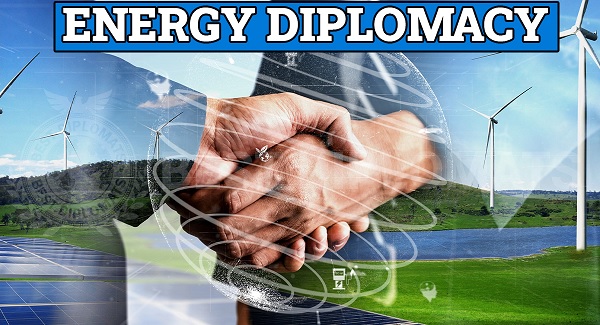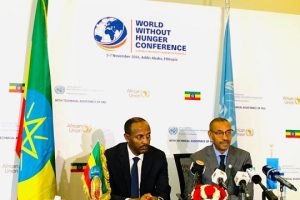
In many frontiers, Ethiopia has continued to be the linchpin in its region and continent. The country has been spearheading efforts to expedite regional and continental integrations through sovereign and collective infrastructural projects.
And as Mother Nature gifts the country hydro potential abundantly, the country is currently working to unlock its blessings and benefit not only just itself but the entire region.
Ethiopia has started the journey of becoming the powerhouse of Africa, especially the Horn. It is important to remember that Ethiopia has built a number of electric dams including the soon to be inaugurated Abbay Dam. However, the country is doing its level in order to export the generated electric power to the region and neighboring states.
In recent times, the government has started to sell its power to its neighboring nation Kenya in addition to the previously agreements with Sudan and Djibouti. On November 2023, Ethiopia has officially started exporting its power to Kenya. According to reports, the long-awaited power sale to Nairobi came true after Ethiopia conducted a successful test run of electricity supply to Kenya via the 500KV cross-border transmission power line built to link power grids of the two neighbors. The Ethiopian Electric Power (EEP) stated that Ethiopia has completed activities to ensure uninterrupted and reliable transmission of power to Kenya while noting that Kenya will similarly execute and implement pending activities on its part.
The government sets a long- term plan to generate adequate income from its electric power exporting scheme. For instance, Ethiopia, as to reports, plans to earn around $100 million annually from electricity exports to Kenya. Kenya also signed a 25-year power purchase deal with Ethiopia to import 600 megawatts of electricity from Ethiopia.
The deal, which runs until 2047, between Kenya and Ethiopia is a kind of a deal that approves mutual benefit for both nations. The deal makes Ethiopia Kenya’s second biggest source of hydropower.
The report noted, “Kenya has turned towards cheaper sources of electricity in a bid to edge out the expensive electricity from independent power producers and ensure buffers to meet peak demand. Dubbed Ethiopia-Kenya Transmission Interconnection Line, the 1,045km long electricity highway has the capacity to transmit up to 2,000 megawatts. The project is part of the Eastern Africa Power Pool (EAPP), a regional institution established in 2005 to coordinate cross-border power trade and grid interconnection among nations of the Eastern Africa region.”
The report further explained that Ethiopia is exported a cheaper hydro- processed electricity to Sudan and Djibouti in the previous year and earned $95.4 million from electricity exports to the two countries, according to EEP.
“Ethiopia, has been investing billions of dollars in building hydropower plants in a bid to become the region’s leading power exporter. The country is preparing to start selling electricity to Eritrea, South Sudan and Somalia. Addis Ababa has also signed memorandums of understanding with Somaliland, Tanzania and other African countries to supply them electricity,” as to the report.
On another report, while paying a visit to Dar es Salaam, Tanzania, Prime Minister Abiy Ahmed (PhD) has signed two agreements with his counterpart on cooperating on aviation and the selling of electric power. Ethiopia has agreed to sell 400 megawatts of energy to Tanzania. As to Ethiopia Electric Power (EEP), Ethiopia hopes to generate revenue worth around 30 billion birr from its electric power selling to domestic and abroad customers in the current fiscal year.
By the same token, in an exclusive interview with a local media, Habtamu Itefa, minister of Water and Energy stated that Ethiopia has earned more than 1 billion USD from electric power export to neighboring countries in 18 months. The revenue was generated during the months up until the end of 2015 Ethiopian fiscal year.
According to him, the performance underscores the nation’s burgeoning role as a regional energy powerhouse, catalyzing regional integration. While acknowledging fluctuations, Habtamu highlighted the growing demand for Ethiopian electricity, with recipient countries witnessing a 15% annual surge.
“We are successfully supplying energy to Sudan, Djibouti, and Kenya, the minister noted, lauding the pivotal interconnection between Ethiopia and Kenya’s power grids that extend the possibility of exports as far as South Africa via the East African Power Pool,” the minister added.
He further pointed out that “Ethiopia is blessed and conveniently positioned to provide clean, inexpensive electricity without harming the environment, fueling escalating demand.”
The minister revealed that the nation has also made significant strides domestically, with 4.5 million customers connected to the grid in the past six months alone. However, challenges persist due to the scattered population with only 52% accessing power at present.
The remaining 48% residing off-grid necessitates a concerted push towards decentralized solutions, the minister said, adding to bridge the gap, the ministry is actively implementing off-grid projects by harnessing solar, wind, biogas, and geothermal energy while promoting clean cooking technologies.
Habtamu disclosed that ambitious initiatives have been underway in Oromia and the Somali regions to leverage solar power until grid connectivity is established in remote localities. As Ethiopia forges ahead in optimizing its diverse energy portfolio, the nation’s electricity exports emerge as resounding testament to its pivotal role in fostering regional cooperation, economic development, and sustainable growth through renewable energy leadership.
In fact, Ethiopia has been a major actor in any activities in Africa and put its finger print on major achievements of the continent. From the time of colonialism to the present day, Ethiopia has been playing the role of protagonist both in the continental and regional issues. Ethiopia has always been introducing new and vital action to the continent and the Horn. It is the focal point in relation to economic, political, and social affairs of the continent.
In good truth, Ethiopia, as the sole nation that was not colonized, did everything to liberate its sister African nations from the shackles of colonialism. The country has also done a notable deed in the realization of the continental organization, the African Union. Ethiopia was and still is operating in the modern fashion to sustain the gained successes of the continent.
The country is still trying to be the voice of Africa in numerous occasions including the call for equal representation in the world’s major blocs and high tables. Ethiopia is playing as a catalyst regarding the whole movement for the Africa’s permanent representation in the United Nations Security Council (UNSC). As the country had done in the time of colonialism to be the voice for the voiceless in many international scenarios, the country is still doing the same in maintaining the benefit of the continent.
Similarly, the nation has been doing everything to ensure the peace and security of the Horn as the country has been providing the necessary provisions to the cause. As the area is very volatile and attracts the attention of many superpower countries across the globe, Ethiopia is still trying to play its role to secure the region’s peace. It has also been working to connect the nations of the region through economic, political and social aspects. And, energy has become the new frontier.
BY DANIEL ALEMAYEHU
THE ETHIOPIAN HERALD TUESDAY 19 MARCH 2024




